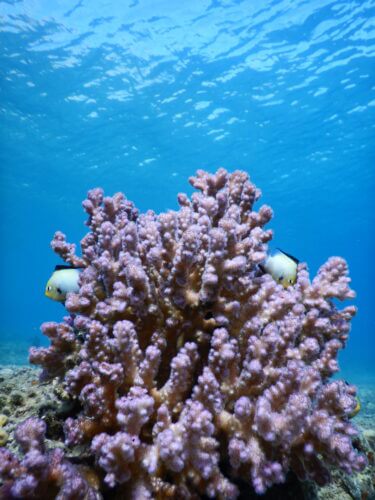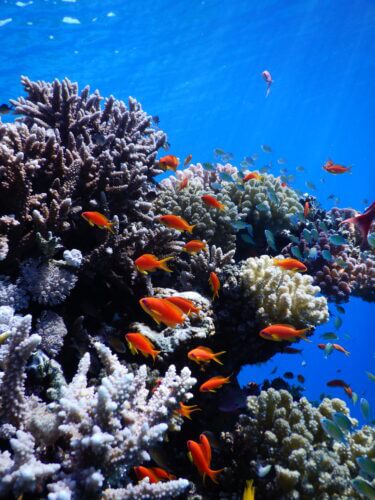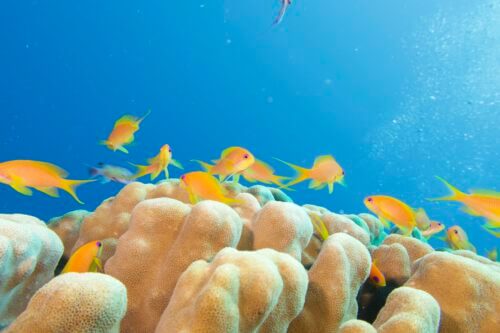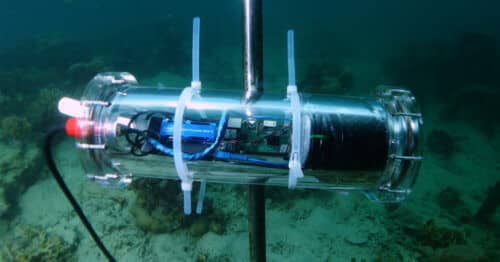Scientists from Bar-Ilan University and various universities around the world, including Egypt, Jordan and Saudi Arabia, are collaborating with the goal of saving the coral reefs in the Red Sea.

Despite the political tensions between countries along the Red Sea, researchers from around the world joined together and established an international action team, together calling on UNESCO to declare the coral reef of the Red Sea a world heritage site while recommending additional steps critical to the survival of the reef.
The Israeli representation in the international action team is led by Prof. Maoz Payne, from the Faculty of Life Sciences, at Bar-Ilan University.
Rapid warming of the oceans as a result of climate change threatens the existence of coral reefs. It is estimated that 70-90% of all reefs will be severely damaged by the middle of the century, even if the 1.5◦C goal according to the Paris climate agreement is reached. However, the coral reefs in the Gulf of Eilat, in the northernmost part of the Red Sea, have a particularly high resistance to seawater warming, despite the rapid rate of warming in our regions. These corals withstand rising temperatures that in other reefs would cause severe bleaching and death.
While the Gulf of Eilat may be a haven for coral reefs, the corals in the area are challenged by local disturbances such as pollution and overexploitation that must be removed quickly. In a recent study published in Frontiers in Marine Sciences, an international group of researchers laid out these challenges and suggests several necessary steps that they say must be implemented immediately to protect the reef from increasing local threats.
The research was led by Dr. Karin Kleinhaus, from the School of Marine and Atmospheric Sciences at Stony Brook University, in New York, in collaboration with Prof. Maoz Payne, from the Faculty of Life Sciences at Bar-Ilan University, together with a group of scientists who studied the corals of the Red Sea in Egypt, Israel, Jordan , Saudi Arabia, Australia, the United States and Switzerland. The Swiss ambassador to Israel also contributed to the article. The cooperation of these authors, despite the regional political tensions, emphasizes the importance of the call for immediate action.
The coral reefs of the Red Sea provide food and a source of livelihood for a population of over 28 million people, which is growing rapidly along the coastline. In addition, the reefs are a uniquely rich potential source of new drugs and natural substances. However, as towns and cities continue to grow along the Red Sea, these areas are putting significant local pressure on its reefs. Parts of the reef have already been severely damaged as a result of uncontrolled tourism, human population expansion, overfishing and beach development that have led to pollution and a decline in coastal water quality.

Despite existing environmental stressors and recent new threats, coordinated scientific research or management efforts that encompass the entire Red Sea reef complex are almost non-existent. The researchers claim that the most urgent goal is to advance the immediate protection of the Gulf of Eilat as a world heritage site as part of an initiative involving Egypt, Israel, Jordan and Saudi Arabia. Ideally, they say, scientists, conservationists and policy makers should recommend that UNESCO recognize the Red Sea Coral Reef as a Marine World Heritage Site. Scientists and regional governments should work together to implement transboundary research, monitoring and conservation efforts and seek UN support for a long-term scientific monitoring program. Considering the political reality, the authors confirm that regional cooperation can be effectively facilitated by the Red Sea Center, a neutral organization established in March 2019 and located at the prestigious Swiss institution Ecole Polytechnique Fédérale de Lausanne (EPFL).
The researchers recommend several additional steps that include; Long-term regional cooperation to remove the threat to the reefs from new coastal development and the accompanying population expansion, and sustainable development of the Red Sea coastline.
"The threats to the reefs of the northern Red Sea are intensifying and we will have to work together to preserve the reefs despite the many diplomatic challenges. Otherwise, we will have to explain to future generations that we stood by when our generation destroyed one of the last thriving reefs", the authors conclude.

Earth Day: Intel's artificial intelligence in the service of saving coral reefs
Intel collaborates with Accenture and the Solovay Foundation for the Protection of the Environment in the development of CORaiL technology that helps save and restore coral reefs
There is no dispute that coral reefs are in danger. The UN has also stated this in the past. The reasons are diverse: overfishing, trawlers fishing in the deep sea, the increase in temperature and development of beaches contrary to the principles of existence. A new technology based on artificial intelligence, announced today on the occasion of Earth Day, will help save them.
איך זה עובד?
The amount of fish and their diversity is an important indication of reef health. Previous efforts to monitor reefs involved divers taking videos and pictures of the reef but in their efforts these efforts disrupted marine life by forcing the fish into places of refuge. In addition, these initiatives endangered the divers and their implementation took a lot of time.
Smart underwater cameras equipped with Accenture's video analytics services platform locate and capture the passing fish. Artificial intelligence that is at the base of the technology counts and classifies the marine species. The data is then sent to an onshore dashboard, providing researchers with real-time analytics and trend analysis to help them make data-driven decisions. The video analysis of the fish is based on Intel FPGAs, Intel's Movidius vision processing unit and the Intel version of the OpenVino toolkit.
The engineers are already working on the next generation project: a CORaiL prototype that will include a backup for the power supply and infrared cameras that will allow filming at night and thus provide a complete picture of the reef ecosystem. Other uses may include tracking the rate of migration of tropical fish to colder countries and monitoring disturbances to protected or restricted underwater areas.

The artificial intelligence-based solution for monitoring and restoring coral reefs was tested as a pilot in May 2019 in the reef surrounding the island of Pangatalan in the Philippines. To date, the solution has collected about 40,000 images for use by the researchers who measure the health of the reef in real time.
"The CORaiL project is an amazing example of how artificial intelligence and edge computing can be used to assist researchers monitoring and restoring coral reefs. We are proud to partner with Accenture and the Subai Environmental Defense Fund in this important effort to protect the planet,” said Rose Schuler, corporate vice president of Intel's sales and marketing group.
Coral reefs are among the most diverse ecosystems in the world. They have thousands of coral species that provide a living space and shelter for about 25% of the world's marine life species. Coral reefs also benefit humans: they protect coastlines from tropical storms, provide food and income for about a billion people, and annually generate $9.6 billion in tourism and recreation revenue. But according to the data of the United Nations Environmental Protection Program, coral reefs are in danger due to overfishing, trawlers fishing in the deep sea, the rise in temperature and beach development contrary to existing principles.
"Artificial intelligence provides an unprecedented opportunity to solve some of the most troubling problems in human society," said Jason Mitchell, Accenture's managing director of communications, media and technology and the company's liaison to Intel. "The ecosystem we have established, which includes corporate and social partners in this project of 'artificial intelligence for the benefit of society', proves that organization and cooperation make it possible to have a positive impact on the environment."
More of the topic in Hayadan:

One response
Good joke, we destroy excessive diving. There is no supervision by any authority. The reefs should be closed. The diving should be limited. Areas on the beach should be closed for a few years and only then opened. The state is to blame.